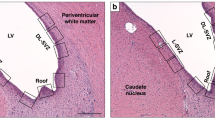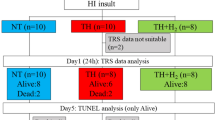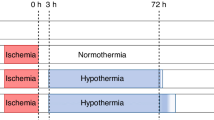Abstract
ABSTRACT: Severely birth-asphyxiated human infants develop delayed (“secondary”) cerebral energy failure, which carries a poor prognosis, during the first few days of life. This study tested the hypothesis that mild hypothermia after severe transient cerebral hypoxia-ischemia decreases the severity of delayed energy failure in the newborn piglet. Six piglets underwent temporary occlusion of the common carotid arteries and hypoxemia. Resuscitation was started when cerebral [phosphocreatine (PCr)]/ [inorganic phosphate (Pi)] as determined by phosphorus magnetic resonance spectroscopy had fallen almost to zero and [nucleotide triphosphate (NTP)]/[exchangeable phosphate pool (EPP)] had fallen below about 30% of baseline. Rectal and tympanic temperatures were then reduced to 35°C for 12 h after which normothermia (38.5°C) was resumed. Spectroscopy results over the next 64 h were compared with previously established data from 12 piglets similarly subjected to transient cerebral hypoxia-ischemia, but maintained normothermic, and six sham-operated controls.
The mean severity of the primary insult (judged by the time integral of depletion of [NTP]/[EPP]) was similar in the hypothermic and normothermic groups. In the normothermic group, [PCr]/[Pi] and [NTP]/[EPP] recovered after the acute insult and then fell again. Minimum values for these variables observed between 24 and 48 h were significantly higher in the hypothermic group and not significantly different from the control values (p < 0.05, analysis of variance). A large reduction in secondary energy failure relative to the extent of the primary insult was shown and no further fall in either [PCr]/[Pi] or [NTP]/[EPP] took place up to 64 h in the hypothermic piglets. We conclude that mild hypothermia after a severe acute cerebral hypoxicischemic insult ameliorated delayed energy failure.
Similar content being viewed by others
Article PDF
Author information
Authors and Affiliations
Rights and permissions
About this article
Cite this article
Thoresen, M., Penrice, J., Lorek, A. et al. Mild Hypothermia after Severe Transient Hypoxia-Ischemia Ameliorates Delayed Cerebral Energy Failure in the Newborn Piglet. Pediatr Res 37, 667–670 (1995). https://doi.org/10.1203/00006450-199505000-00019
Received:
Accepted:
Issue Date:
DOI: https://doi.org/10.1203/00006450-199505000-00019



